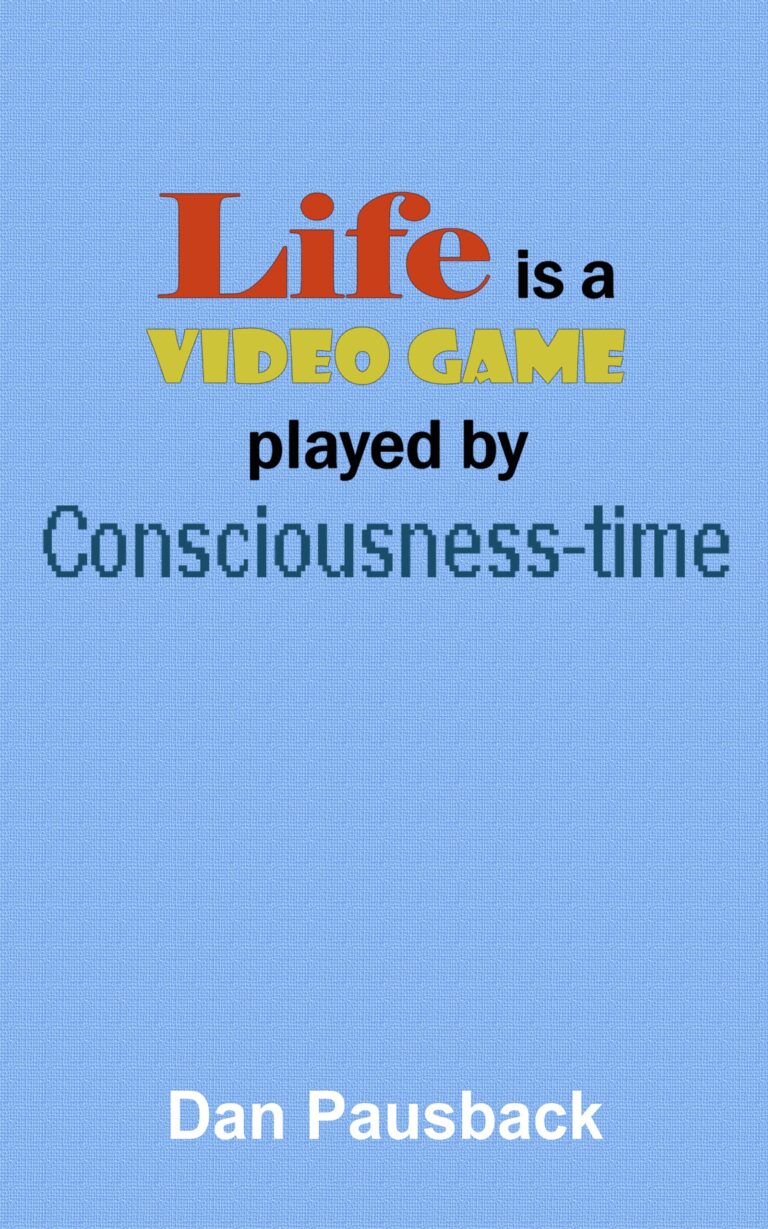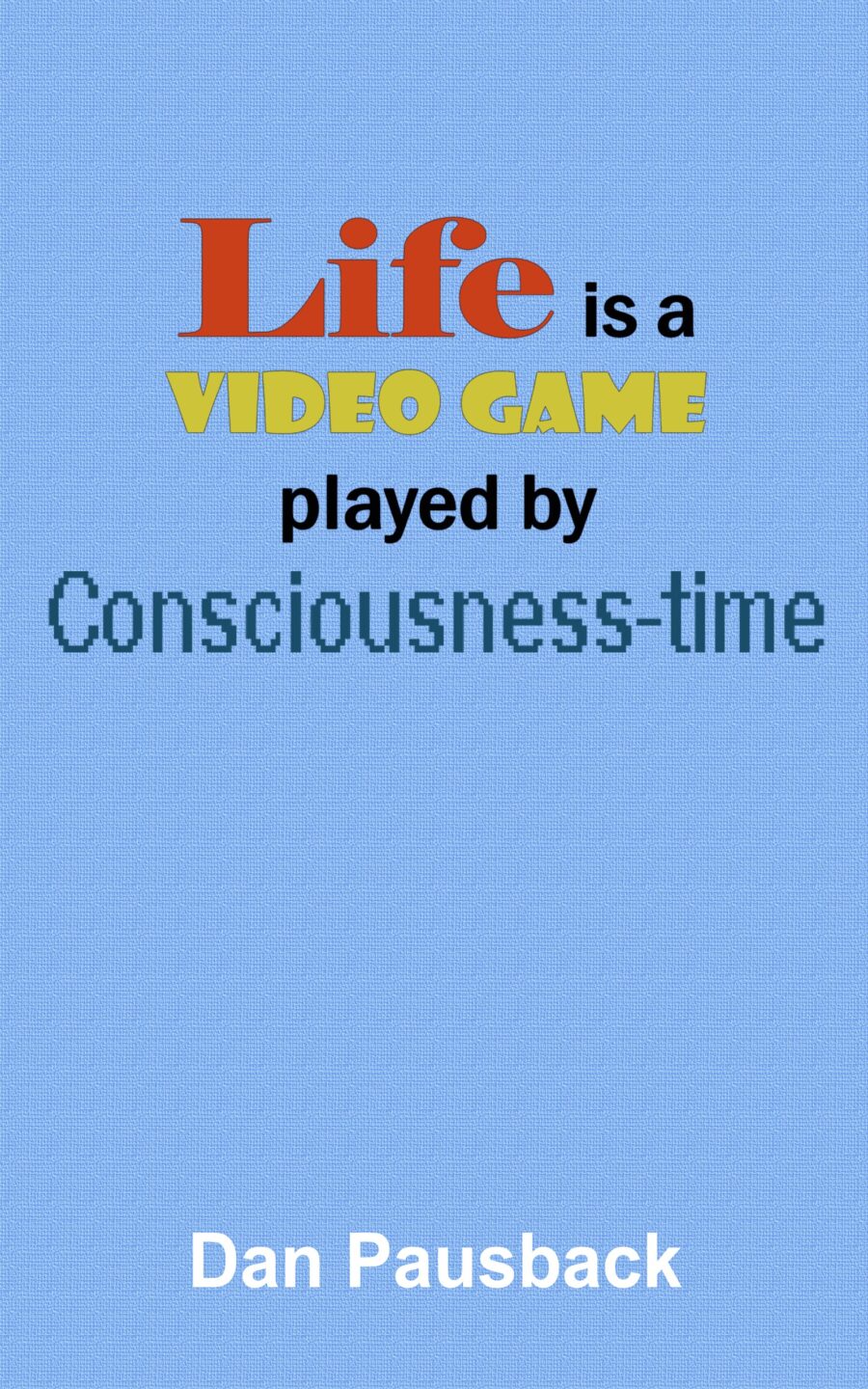As established in the prologue, a traveler to Panama (“D”) learns of an American expatriate living in semi-reclusion: a former game designer and professor (“K”). The text represents the three-day interview between them, in which D prompts K to expound upon his philosophy of life, grounded primarily in simulation theory: the idea that our observed reality is in fact a simulation designed by a higher consciousness for some greater purpose.
Dan Pausback’s LIFE IS A VIDEO GAME PLAYED BY CONSCIOUSNESS-TIME covers a lot of ground. The underlying substrate is simulation theory, but across its length, it touches on the placebo effect, near-death experiences (NDEs), quantum mechanics, psychedelics, synchronicity, and other thought-provoking phenomena— many of which are often discussed in fringe settings as “evidence” (or at least, suggestions) that there’s more to reality than our culture generally allows. There’s nothing wrong with having those conversations amongst friends, or with good-faith inquiry about understudied phenomena, but it’s hard to justify over a hundred thousand words on these topics when the verbose mystic K admits, quite early on, “Many of my ifs are wildly speculative” (though he hedges, “once the assumption is presented, I try to make sure all the correlative thens are logical”). He further acknowledges that “if you’re willing to squeeze yourself through the narrow corridor of statistics, you can explain away most everything.” Ultimately, he insists he’s “not advocating anything for anyone except [himself].” In short: the initial premises here are arbitrarily established without underlying evidence; rational inquiry can do as well, if not better, at explaining the apparent mysteries or contradictions under discussion; and the text eschews any responsibility for its own claims, or any suggestion that the reader should learn any lessons to apply to their own life. When the text itself makes these admissions, why should a reader devote their time and energy to it?
As it turns out, it’s hard to draw any lessons from LIFE IS A VIDEO GAME, even if one hoped to do so. The structure, for instance, is too loose. In the prologue, D establishes that the text is minimally organized as “a free flow of ideas, similar to a podcast,” but this just isn’t a useful way to write a book—especially a book about a complex, idiosyncratic idea structure. Simulation theory, for instance, is the starting point and fundament of this book, but it’s over halfway through the text before D asks K why he believes that reality is a simulation. Even if there were a good answer, it should have come much earlier on. Meanwhile, the text has a habit of misusing words or eliding past clear definitions. K frequently refers to “materialism,” for example, in ways that suggest its casual, popular use, relating to an attitude or action being “materialistic”—that is, overly concerned with material possessions or money. But “materialism” is a philosophical school whose main tenet is simply that there is no reality outside of material reality; it’s related to modern society’s obsession with material goods, but it’s not the same thing. Weasel words and outright errors like this make it hard to trust any of the text’s argumentation, even in moments where it’s more lucid.
There are some clear, valuable moments in the text—as when K declares, “Being able to face all the horrors and hardships of this world and still be caring, ethical, and fair is what takes real courage.” But these gems are few and far between, and even they are insufficiently supported by any actual logical argumentation. If a reader wants to listen to a stranger babble at them in hopes of hearing something interesting, that’s fine; but it can’t be recommended on its merits.
Dan Pausback’s LIFE IS A VIDEO GAME PLAYED BY CONSCIOUSNESS-TIME refers to and regurgitates plenty of semi-mystical ideas about how and why to live, but it contributes little new material and facilitates little understanding.
~Dan Accardi for IndieReader


